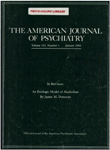Implications of the efficacy of thiothixene and a chlorpromazine- imipramine combination for depression in schizophrenia
Abstract
The ineffectiveness of antidepressants, and the effectiveness of neuroleptics alone, in the treatment of depressed schizophrenic patients is evidence that a pharmacologically definable depression cannot be demonstrated in schizophrenia. The author reports findings from a double-blind 1-month study of 52 anergic and depressed schizophrenic patients given thiothixene-placebo or chlorpromazine- imipramine. These findings support DSM-III, which does not diagnose intercurrent, secondary depression in the presence of schizophrenia. Consistent with most of the clinical literature, this study also supports the use of a single neuroleptic rather than neuroleptic- antidepressant combinations to treat depressive symptoms secondary to schizophrenia.
Access content
To read the fulltext, please use one of the options below to sign in or purchase access.- Personal login
- Institutional Login
- Sign in via OpenAthens
- Register for access
-
Please login/register if you wish to pair your device and check access availability.
Not a subscriber?
PsychiatryOnline subscription options offer access to the DSM-5 library, books, journals, CME, and patient resources. This all-in-one virtual library provides psychiatrists and mental health professionals with key resources for diagnosis, treatment, research, and professional development.
Need more help? PsychiatryOnline Customer Service may be reached by emailing [email protected] or by calling 800-368-5777 (in the U.S.) or 703-907-7322 (outside the U.S.).



